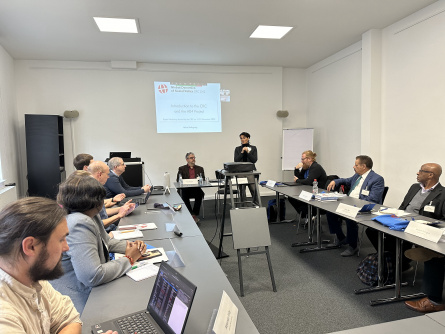
The workshop "Exploring healthcare system introductions and historical developments in Kenya and Nigeria within the context of nation-building and post-colonialism" of the project A04 "Global Developments in Healthcare Systems" took place from 1.11.2023 to 3.11.2023 at the Haus der Wissenschaft, Bremen, and was organized by Lorraine Frisina-Doetter and Julian Götsch.
The aim of the workshop was to bring together leading experts on the historical development and current design of healthcare systems in Nigeria and Kenya. The focus was on the influence of colonialism and nation-building on the introduction and subsequent reforms of the healthcare systems in the two countries. Philip Aka (International University of Sarajevo, Bosnia and Herzegovina), Mario Azevedo (Jackson State University, USA), Joseph Balogun (Chicago State University, USA), Diana Cassells (Purchase College, New York, USA), Pascal Grosse (Charité Berlin, Germany), Daniel Künzler (University of Fribourg, Switzerland), Rebecca Martin (London School of Hygiene and Tropical Medicine, UK), George Ndege (Saint Louis University, USA) and Friday Okonofua (University of Benin, Nigeria) participated in the workshop as experts on the historical development of the healthcare systems in Kenya and Nigeria.
After an introduction and welcome speech by Heinz Rothgang of the A04 project, the workshop opened with a presentation by Mario Azevedo on the impact of colonialism on health systems in Sub-Saharan Africa. Followed by presentations and subsequent discussions of the A04 project's work by Lorraine Frisina Doetter and Sebastian Haunss, the first day concluded with an extensive and critical roundtable discussion on the utility and the limitations of the concept of nation-building in the post-colonial context of sub-Saharan Africa. From the very beginning, the workshop was characterized by lively discussions and intensive exchange, which characterized it until the end.
The following days were dedicated to the historical developments of the healthcare systems in Nigeria and Kenya. In their presentations on Nigeria Joseph Balogun, Friday Okonofua, Rebecca Martin, Diana Cassells and Philip Aka highlighted different perspectives on the evolution of the healthcare system. They shed light on the historical development of health professions, the evolution of health services and the collaboration of different actors during colonialism, the impact of the Coloniality of Sovereignty and the continuing British influence on healthcare in Nigeria today. In their presentations on Kenya, George Ndege and Daniel Künzler focused on the institutional continuities of the healthcare system from colonialism until today, discussed the history of health reforms in the country and analyzed the political rhetoric that accompanies them. The workshop ended with Pascal Grosse's presentation on the connection of Public Health and colonialism in Sub-Saharan Africa today.
The workshop contributed to an intensive exchange among the participants by sharing expertise and different perspectives on the two countries. Furthermore, two focus group discussions that were conducted during the last day will contribute to the work on a comparative case study of the developments of the healthcare system in the two countries. Beyond the scope of the workshop, the possibility of a long-term exchange within the group and a joint publication was discussed.
Contact:
Dr. Lorraine Frisina Doetter
Julian Götsch













